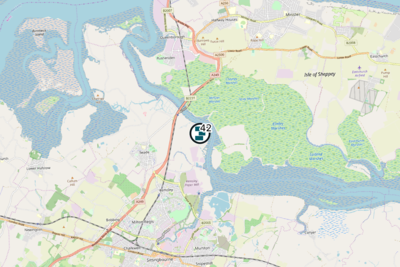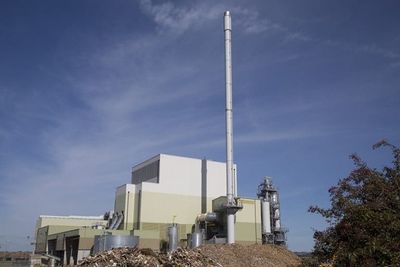Ridham Biomass Power Plant
| Ridham Biomass Power Plant Operational | |
 See Biomass EfW → page for a larger UK Wide map. | |
| Operator | MVV Environment Ridham Ltd |
| Capacity | 25.42 MWe |
| Feedstock | Waste Wood |
| EPR (Waste Licence) | TP3536CL |
| ROC | Yes |
| CfD | |
| CHP | Yes |
Operators Annual Report
Input Data
| Year | Wood | Litter | RDF | Other | Total |
|---|---|---|---|---|---|
| 2017 | 143751 | 0 | 0 | 2438 | 146189 |
| 2018 | 177041 | 0 | 0 | 0 | 177041 |
| 2019 | 148602 | 0 | 0 | 0 | 148602 |
| 2020 | 185432 | 0 | 0 | 0 | 185432 |
| 2021 | 177247 | 0 | 0 | 0 | 177247 |
| 2022 | 154069 | 0 | 0 | 0 | 154069 |
Output Data
| Year | IBA | IBA %ge of Tot IN | APC | APC %ge of Tot IN |
|---|---|---|---|---|
| 2017 | 7398 | 5.06% | 1623 | 1.11% |
| 2018 | 9707 | 5.48% | 1763 | 1.00% |
| 2019 | 8254 | 5.55% | 1467 | 0.99% |
| 2020 | 12652 | 6.82% | 2109 | 1.14% |
| 2021 | 11078 | 6.25% | 1947 | 1.10% |
| 2022 | 9194 | 5.97% | 1767 | 1.15% |

Summary
A Combined Heat and Power (CHP) Biomass EfW facility based on consuming up to 172,000 tonnes per annum of Wood Waste to produce 23 MW power to be exported to the national grid. The heat that is produced is either fed into the district heating network or is used as process steam for industrial processes. The facility is located at Ridham Dock near Sittingbourne in the county of Kent.
The facility was developed and continues to be operated by MVV Environment, becoming fully operational in November 2016[1].
Plant
The facility cost approximately £126 million to develop[1].
MVV Environment acted also as the EPC contractor for this project, the design of the facility comprises of 1 stream process with air cooling grate[2].
Tonnage Input/Fuel
The tonnage received by the plant is Wood WasteBiomass and in the most recent Annual Sustainability Report for 2018-19[3] Ofgem reported the following fuel received:
| Biomass | Tonnage (2018-19) |
|---|---|
| Wood Waste | 173,604 |
| Other | 0 |
| Total | 173,604 |
The Wood Waste tonnage received is locally sourced and comprises of Category B and Category C Wood Waste that cannot be reused, such as processed wood, wood with a low to medium degree of contamination such as chipboard, fibreboard and old furniture, and wood from the construction and demolition of buildings[2]. The tonnage cannot be directly compared with the stated historical tonnage received and recorded in the EA statistics as these are recorded on a calendar year basis (i.e. January 2018 to December 2018) and were 178,075 tonnes.
References
- ↑ 1.0 1.1 Lets Recycle, 2016. MVV Opens Ridham Dock Waste Wood Biomass Plant. Online. letsrecycle.com. [Accessed 22 April 2020.
- ↑ 2.0 2.1 MVV, 2020. About Our Plant - MVV Energie AG. Online. MVV Energie AG(Accessed 22 April 2020)
- ↑ Biomass Sustainability Dataset 2018-19
